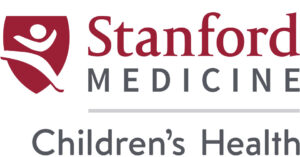Catch up on the latest news and headlines about child and maternal health, Lucile Packard Children’s Hospital Stanford, and the Stanford School of Medicine.
Years of Philanthropic Support Lead to a Long-Awaited Allergy Drug
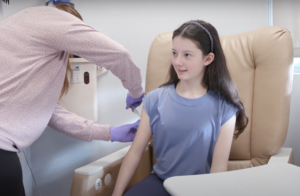
A recent Stanford-led study introduced a treatment that can prevent dangerous reactions to accidental ingestions of allergy-triggering foods. “This is something that our food allergy community has been waiting a long time for,” says Sharon Chinthrajah, MD. Chinthrajah is the acting director of the Sean N. Parker Center for Allergy and Asthma Research.
The groundbreaking study, published in The New England Journal of Medicine, marked a huge milestone for food allergy research. Recognizing the significance of the study’s findings, the FDA has already approved the treatment, the first-ever drug that protects broadly against food allergy reactions.
The story of how philanthropy led to this breakthrough treatment is equally powerful. While the study was funded by a grant from the National Institute of Allergy and Infectious Diseases, the behind-the-scenes support of steadfast donors over more than a decade was indispensable. Today, more than 90% of the Center is funded by philanthropy—an astounding level of donor engagement.
Smartwatches Can Pick Up Abnormal Heart Rhythms in Kids
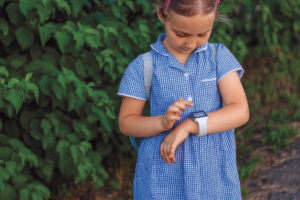
Smartwatches can detect and diagnose abnormal heart rhythms in kids, according to a Stanford study. By surveying the records of patients at Lucile Packard Children’s Hospital Stanford, researchers identified 29 cases in which children were diagnosed with arrhythmias for the very first time, thanks to the use of a smartwatch.
As an easy-to-wear device that can monitor heart rhythms, a smartwatch might be able to help more kids like 15-year-old Connor, whose erratically racing heart was hard to capture with a conventional adhesive monitor. Instead, Connor’s mother was able to use her own smartwatch to capture the abnormal rhythms—data used by Scott Ceresnak, MD, to confirm a condition called supraventricular tachycardia. Ceresnak was then able to perform a targeted medical procedure that destroyed the cells causing Connor’s heart essentially to short-circuit. The potential use of smartwatches as a convenient tool in diagnosing heart conditions opens up exciting new possibilities.
Packard Children’s Transplant Patients Celebrated by Golden State Warriors

Several patients from Lucile Packard Children’s Hospital Stanford had the thrill of a lifetime as they stood next to Golden State Warriors players during the national anthem. On African American Heritage Night at Chase Center, the Warriors celebrated seven children and teens, ranging in age from 9 to 19, who received or are awaiting organ transplants. The event drew attention to the broad need for organ donation, as well as the importance of diversity in the donor population.
‘Baby Whisperer’ Marks 24 Years in the Volunteer Cuddler Program
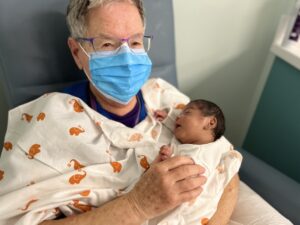
Sue Moses, who is 81 years old, has volunteered in Lucile Packard Children’s Hospital’s Cuddler Program for 24 years. She supports the care team by cuddling and rocking the hospital’s tiniest patients week after week.
Parents often tell Moses how reassuring it is to know someone is holding and nurturing their baby when they can’t be around 24/7. Doctors and staff have also taken note of Moses’ special talent at calming fussy babies and keeping them relaxed during procedures. In the unit, Moses has earned the nickname “baby whisperer.”
Ma Appointed Division Chief of Pediatric Cardiac Surgery
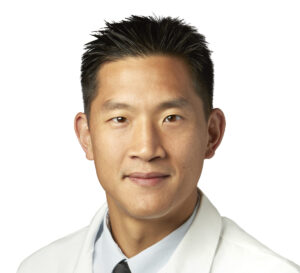
Michael Ma, MD, has been appointed the new chief of the Division of Pediatric Cardiac Surgery at Packard Children’s. Ma, an assistant professor of cardiothoracic surgery, will build upon the storied, 20-year-plus legacy of Frank Hanley, MD, cardiothoracic surgeon and executive director of the Betty Irene Moore Children’s Heart Center. Hanley will continue his leadership role as executive director at the Heart Center and will keep caring for pediatric heart patients.
Ma’s practice encompasses all aspects of congenital heart disease, with an emphasis on neonates, complex biventricular repair, pulmonary artery reconstruction, and heart failure.
Chao Named 2024 Presidential Leadership Scholar

Stephanie Chao, MD, pediatric surgeon and trauma medical director at Packard Children’s, has been named a 2024 Presidential Leadership Scholar. Chao is building a national school education program called the P.L.E.D.G.E. campaign to reduce gun violence among youth. Her work was chosen based on its promise to improve a national problem and aid civic engagement and social good across the country.
“I believe we must draw on data gathered from research, lessons learned at the bedside, and the power of education to create an evidence-based gun safety program for schools that can improve the safety of all children and their families,” Chao says.
This article originally appeared in the Spring 2024 issue of the Packard Children’s News.
